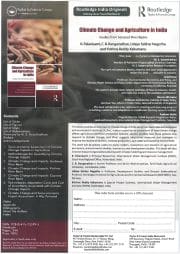By Nitasha Nair, Senior Communications Officer, IWMI India.

Photo: Hamish John Appleby/IWMI
Over a quarter of all rice production in just one of the river basins in India, the Godavari Basin, could be lost to climate change according to a new book, published today. This will affect millions of people across the country, threatening national food security. But simple “no regrets” adaptation polices could avert this crisis. Using advanced econometric models to work out what the impact on agriculture will be, say the authors, policymakers would be better prepared to plan for suitable adaptation strategies.
The new book, Climate Change and Agriculture in India: Studies from selected river basins is the first ever attempt to bring together half a decade’s scientific study to provide a quantitative assessment of how agricultural systems would be affected and to suggest a set of counter adaptation strategies. To make it more accurate, scientists included socio economic variables along with climate variables such as rainfall and temperature and downscaled their study to a river basin level.
The research, funded by The Royal Norwegian Embassy and the CGIAR Research Program on Climate Change, Agriculture and Food Security (CCAFS) analyzed three major river basins in India: the Godavari, Krishna and the Cauvery, at different times of the year to better understand the possible yield reduction of different crops due to changes in temperature and rainfall pattern. The scientists hope the results will help pinpoint areas where strategies for adapting to climate change can be integrated with government programs.

“We have spent the last five years in the field experimenting, piloting, scaling up and validating the impact of different adaptation strategies for increasing crop production and efficient use of irrigation water,” said Dr Palinisami, “A number of strategies for each basin have been identified which could be implemented either in isolation or in combination, along with their costs and benefits. We hope the evidence will convince the policymakers that the investment needed to scale up the adaptation strategies, including farmer capacity building programs, is justified. As for the farmers, the cost of not adopting an adaptation strategy would itself be an eye opener.”
The authors make clear that the climate change problem has no one-size-fits-all solution. The book tries to demystify the problem by providing simple tools and approaches which can be applied at the river basin level.
Three key aspects of the climate change challenge are explored in the book: quantifying and predicting climate change impacts on crop yields in the three basins; scrutinizing various adaptation strategies to increase farmer income, save water, increase production and conserve environment; and working out the cost of not adopting the adaptation strategies taking into account the cost of adopting a technology.
Additional information:
Climate Change and Agriculture in India: Studies from selected river basins.
K Palanisami, C R Ranganathan, Udya Sekhar Nagothu and Krishan Reddy Kakumanu. Routledge 2014.
The book is based on research carried out under the following projects:
Climarice
Climawater

